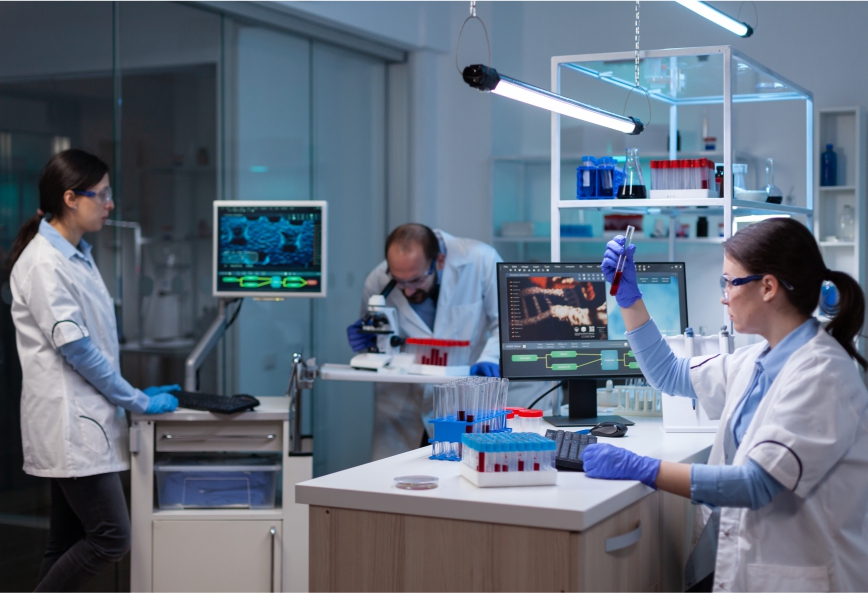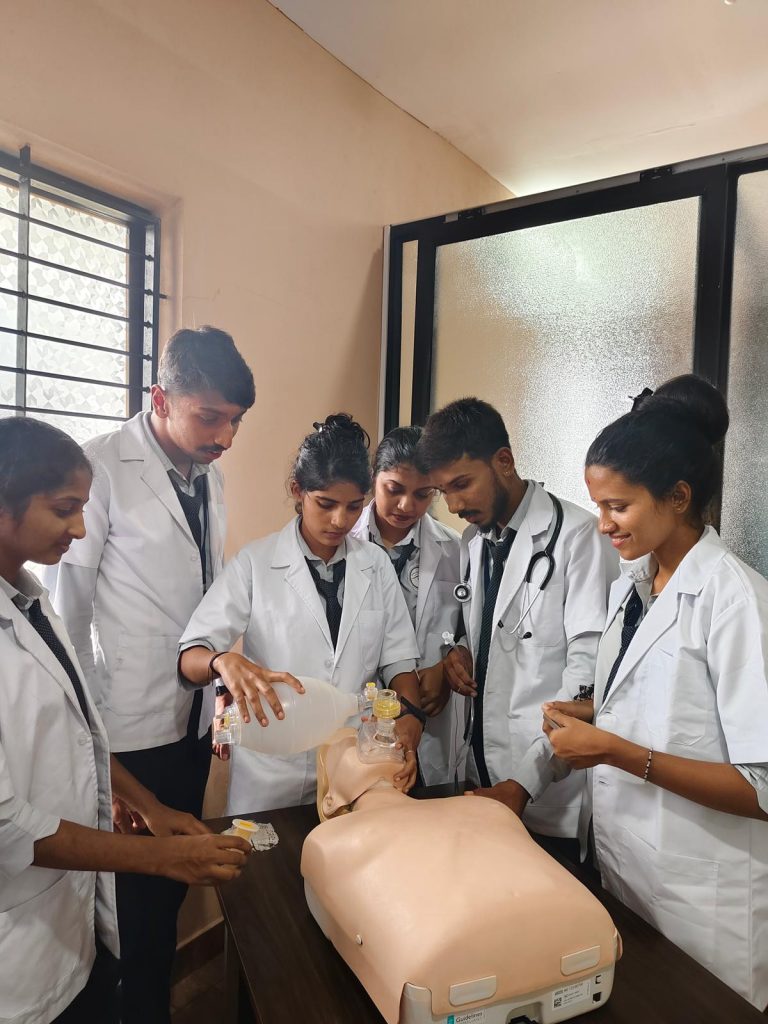Overview

The B.Sc. Medical Laboratory Technology program, also known as Clinical Laboratory Science, is an allied health profession focused on the diagnosis, treatment, and prevention of diseases through clinical laboratory tests. This undergraduate course plays a crucial role in training candidates to learn, diagnose, detect, and treat various diseases, contributing significantly to the field of healthcare.
Key Aspects of B.Sc. Medical Laboratory Technology:
Clinical Laboratory Science: The program emphasizes Clinical Laboratory Science, which involves conducting laboratory tests and analyses to aid in the diagnosis and management of diseases. Medical Laboratory Technologists play a vital role in providing accurate and timely information for patient care.
Diagnostic Skills Development: The course is structured to develop the diagnostic skills of the candidates. Students learn to interpret laboratory results, identify abnormalities, and contribute to the overall healthcare process by providing valuable information to healthcare professionals.
Disease Detection and Treatment: B.Sc. Medical Laboratory Technology focuses on understanding the techniques and methodologies involved in the detection and treatment of various diseases. This includes hands-on experience in analyzing clinical samples and interpreting results.
Sample Collection Methods: The curriculum covers methods of collection for various types of samples. Students are trained in proper and ethical sample collection techniques, ensuring the integrity of the samples and the accuracy of the test results.
Reporting and Documentation: The program also addresses the crucial aspects of reporting, testing, and documentation in the laboratory field. Medical Laboratory Technologists are trained to maintain accurate records, follow standardized procedures, and communicate findings effectively to healthcare teams.
Laboratory Techniques: Candidates gain proficiency in a wide range of laboratory techniques used for analyzing blood, urine, tissues, and other specimens. This includes understanding the principles behind different laboratory tests and utilizing advanced technologies.
Practical Exposure: The curriculum includes practical exposure to real-world laboratory scenarios. This hands-on experience is essential for students to apply theoretical knowledge in a clinical setting, preparing them for the challenges of the medical laboratory profession.
Interdisciplinary Collaboration: B.Sc. Medical Laboratory Technology encourages interdisciplinary collaboration, emphasizing the role of medical laboratory technologists as integral members of the healthcare team. This ensures that graduates are well-equipped to work collaboratively with other healthcare professionals.
In summary, the B.Sc. Medical Laboratory Technology program is designed to produce skilled professionals who play a pivotal role in the diagnosis, treatment, and prevention of diseases. By covering diverse aspects of clinical laboratory science, the program prepares candidates for a rewarding career in the ever-evolving field of healthcare.
- BSc Medical laboratory technology is an undergraduate program also called as Clinical Laboratory Science in an Allied Health Profession that is concerned with diagnosis, treatment, and prevention of disease through the use of clinical laboratory test.
- The course helps the candidate to learn, diagnose, detect and treat various diseases.
- Additionally the course deals with methods of collection of various samples, reporting, testing and documentation in the laboratory field.
B.Sc. Medical Laboratory Technology (B.Sc. MLT)

The B.Sc. Medical Laboratory Technology program, also known as Clinical Laboratory Science, is an allied health profession focused on the diagnosis, treatment, and prevention of diseases through clinical laboratory tests. This undergraduate course plays a crucial role in training candidates to learn, diagnose, detect, and treat various diseases, contributing significantly to the field of healthcare.
Key Aspects of B.Sc. Medical Laboratory Technology:
- Clinical Laboratory Science: The program emphasizes Clinical Laboratory Science, which involves conducting laboratory tests and analyses to aid in the diagnosis and management of diseases. Medical Laboratory Technologists play a vital role in providing accurate and timely information for patient care.
- Diagnostic Skills Development: The course is structured to develop the diagnostic skills of the candidates. Students learn to interpret laboratory results, identify abnormalities, and contribute to the overall healthcare process by providing valuable information to healthcare professionals.
- Disease Detection and Treatment: B.Sc. Medical Laboratory Technology focuses on understanding the techniques and methodologies involved in the detection and treatment of various diseases. This includes hands-on experience in analyzing clinical samples and interpreting results.
- Sample Collection Methods: The curriculum covers methods of collection for various types of samples. Students are trained in proper and ethical sample collection techniques, ensuring the integrity of the samples and the accuracy of the test results.
- Reporting and Documentation: The program also addresses the crucial aspects of reporting, testing, and documentation in the laboratory field. Medical Laboratory Technologists are trained to maintain accurate records, follow standardized procedures, and communicate findings effectively to healthcare teams.
- Laboratory Techniques: Candidates gain proficiency in a wide range of laboratory techniques used for analyzing blood, urine, tissues, and other specimens. This includes understanding the principles behind different laboratory tests and utilizing advanced technologies.
- Practical Exposure: The curriculum includes practical exposure to real-world laboratory scenarios. This hands-on experience is essential for students to apply theoretical knowledge in a clinical setting, preparing them for the challenges of the medical laboratory profession.
- Interdisciplinary Collaboration: B.Sc. Medical Laboratory Technology encourages interdisciplinary collaboration, emphasizing the role of medical laboratory technologists as integral members of the healthcare team. This ensures that graduates are well-equipped to work collaboratively with other healthcare professionals.
- In summary, the B.Sc. Medical Laboratory Technology program is designed to produce skilled professionals who play a pivotal role in the diagnosis, treatment, and prevention of diseases. By covering diverse aspects of clinical laboratory science, the program prepares candidates for a rewarding career in the ever-evolving field of healthcare.
Eligibility
* Candidates should have passed 10+2 level with Physics, Chemistry and Biology as subject of study.
* Lateral Entry: The Candidate who have completed their 2 or 3 years Dilpoma in Operation Theatre Technology can take admission in 2nd year B.Sc Operation Theatre.
Attendance
80% of total number of classes conducted in a year. Only those candidates are eligible to appear for university examination
Higher Studies
Masters in various fields (M.Sc MLT, Masters in medical subjects)
Duration
4 years including 1 year of Internship
Internship
One year (365 days) of Clinical Postings
Job Opportunities
- Medical Technician
- Medical Technologist
- Laboratory In charge
- Quality control Manager
- Health Care Administrator
- Laboratory Consultant
- Laboratory supervisor
- Laboratory information system analyst
Working Field
- Government Hospitals
- Private Hospitals
- Health Care Clinics
- Minor emergency centers
- Private laboratories
- Research facilities
- Pharmaceutical companies
- College/ Universities
Other Courses Offered in B.Sc
NETRA JYOTHI INSTITUTE OF ALLIED HEALTH SCIENCES
Allied Health Sciences & Para Medical Sciences are interdisciplinary medical courses and subjects that are becoming increasingly important in health care systems.

